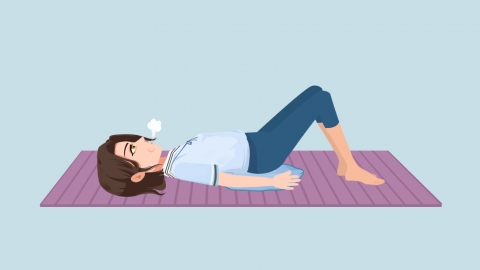What causes soreness in the abdominal area after exercise?
Generally, the main causes of abdominal pain after exercise include abdominal muscle strain, improper breathing during physical activity, acute gastroenteritis, irritable bowel syndrome, and abdominal fasciitis. If discomfort occurs, it is recommended to seek timely medical evaluation and treatment at a正规 hospital. Specific explanations are as follows:
1. Abdominal Muscle Strain
Frequent contraction or excessive stretching of abdominal muscles during exercise can cause minor damage to muscle fibers, resulting in pain that worsens with movement. Stop intense exercise, gently massage the abdomen during rest, apply local heat therapy to promote blood circulation, and gradually increase exercise intensity in future sessions.

2. Improper Breathing During Exercise
Irregular breathing patterns during exercise—such as holding your breath while exerting force—can lead to a sudden increase in intra-abdominal pressure, stimulating nerves in the abdominal wall and causing pain, often accompanied by chest tightness. Adjust your breathing rhythm by synchronizing inhalation and exhalation with movements. When pain occurs, slow down the pace and practice deep breathing to relieve symptoms.
3. Acute Gastroenteritis
Consuming contaminated food before exercising may allow bacteria or viruses to irritate the gastrointestinal mucosa, triggering inflammation. After exercise, increased gastrointestinal motility can exacerbate abdominal pain, often accompanied by diarrhea and nausea. Under medical guidance, medications such as norfloxacin capsules, montmorillonite powder, or berberine hydrochloride tablets may be used. Maintain a light diet and drink warm saline solution to replenish fluids.
4. Irritable Bowel Syndrome (IBS)
Abnormal gastrointestinal motility during exercise can cause spasms of intestinal smooth muscles, leading to abdominal pain that varies in location and is often associated with changes in bowel habits. Under medical supervision, medications such as pinaverium bromide tablets, bifidobacterium triple viable capsules, or trimebutine maleate tablets may be prescribed. Avoid overeating before exercise and reduce intake of spicy or irritating foods.
5. Abdominal Fasciitis
Inflammation of the abdominal fascia caused by repeated pulling or cold exposure can worsen after exercise, resulting in pain. There is usually clear tenderness upon pressing the abdominal wall. Under medical guidance, medications such as celecoxib capsules, eperisone hydrochloride tablets, or Huoxue Zhitong capsules may be taken. Apply anti-inflammatory and analgesic plasters locally and avoid excessive strain on the abdomen.
In daily life, perform proper warm-up exercises before working out to avoid sudden high-intensity activity; maintain regular breathing during exercise and avoid breath-holding; avoid unhygienic food and overeating before exercise; keep the abdomen warm to prevent cold exposure; and seek medical attention promptly if persistent pain occurs, so the underlying cause can be accurately diagnosed and properly treated.









